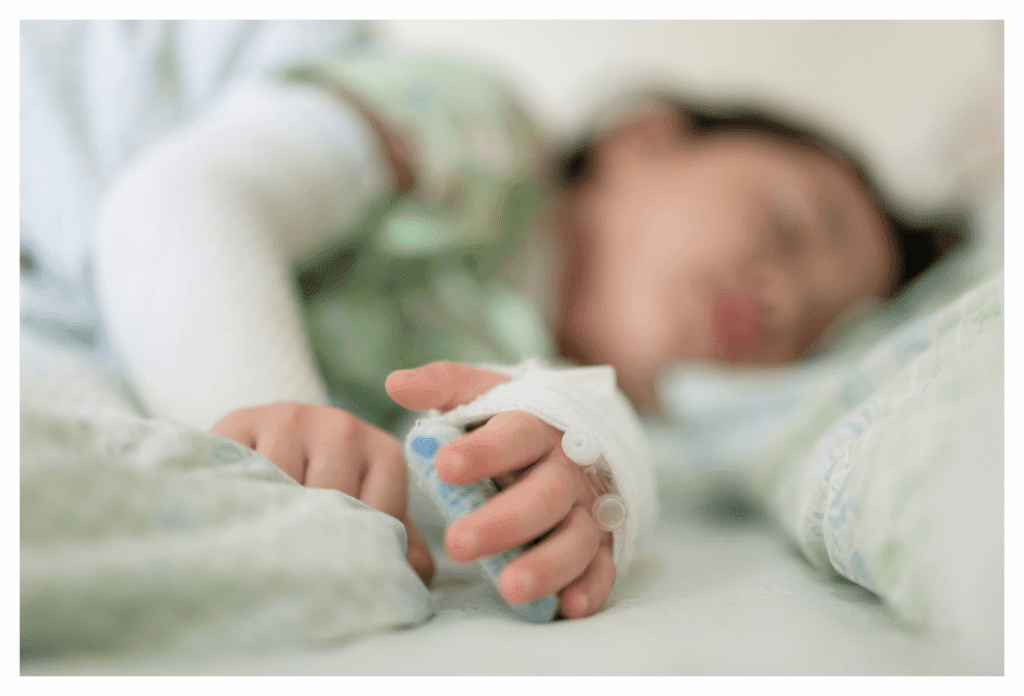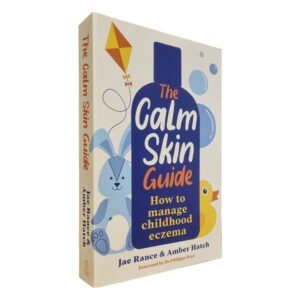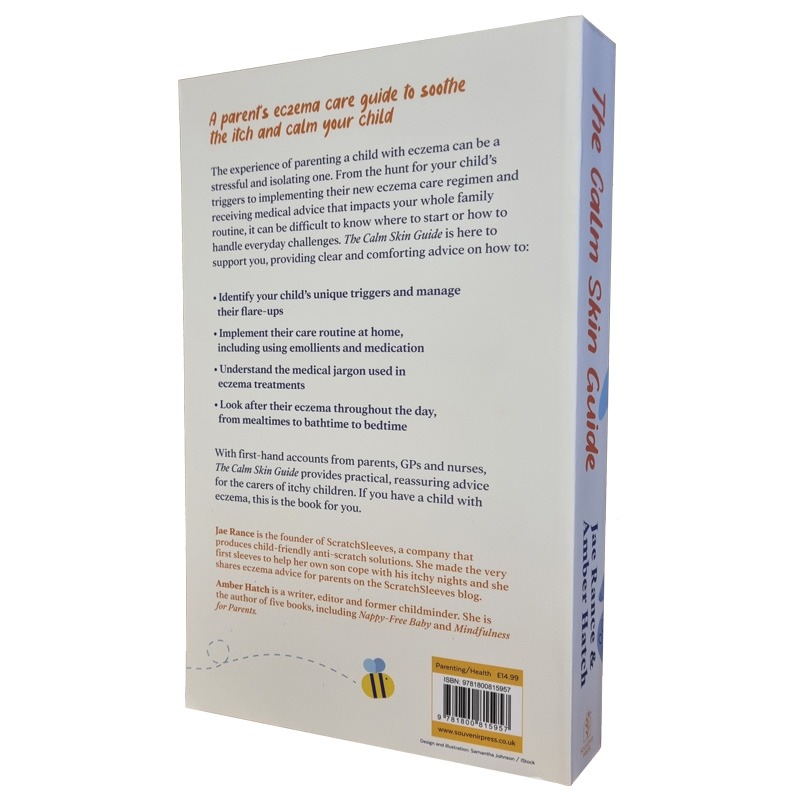Inpatient hospital stays for childhood eczema: what to expect



It is rare for eczema patients of any age to be admitted for inpatient hospital treatment. So if you’re new to childhood eczema: don’t panic, this is unlikely to be something you need to worry about. But if your little one is admitted to hospital for their eczema, this post should help you prepare. We have written this post in conjunction with the brilliant charity, Eczema Outreach Support, and have included the fantastic, practical top tips supplied by their clients.
Why admit eczema patients to hospital?
The usual reasons for hospital admission for eczema patients are:
- Widespread infected eczema that is not responding to the front-line treatments available to GPs and outpatient departments. The hospital staff will be aiming to identify and treat the exact cause of the infection. They will need to take swabs as necessary and the antibiotics may need to be given intravenously.
- Uninfected eczema that has got out of control. The staff will be aiming to use intensive treatments such as wet-wrapping and stronger steroid creams to rehydrate the skin and get eczema back under control.
- Severe eczema around the eyes. Steroid creams can cause complications if they get into the eyes. As a precaution, staff may decide to admit patients in order to treat severe eczema near the eyes.
The length of time that eczema inpatients are in hospital varies widely. It depends both on what exactly your child has been admitted for and how long it takes their skin to respond to treatment. Inpatient stays can vary from as little as 24 hours for anti-viral treatments to over a week for an uncontrolled flare-up.
The logistics
The first thing to say is that, as a parent or carer, you will be able to stay with your child 24/7. However, the number (and sometimes age) of other visitors may be limited. This will depend on the hospital’s visitor policy. The facilities available for parents/carers to use will also vary between hospitals. Most hospitals will have fold-out beds or mattresses available so you can sleep (or at least lie down) next to your child at night. There will be toilet/washing facilities available, but that may well be the limit.
Hospital meals are often only available to patients so, as a parent/carer, you may need to organise your own food. This will be a lot easier if you can ‘tag team’ with a second adult so that you don’t need to leave your child without a familiar adult. If you are on your own, most hospitals have volunteers who should be able to help out (and may well know the coffee shop menu by heart!).
While you are likely to be spending a lot of time on the ward, most children’s wards have a playroom and access to child support workers. Once your child has been seen by the dermatology team and their treatment plan has got underway, ask the ward nurses about play facilities. Even if your child can’t visit the playroom, it may be possible to bring some toys onto the ward.
What to take
- Take your child’s usual emollients and steroids with you, this will ensure that the hospital pharmacy can prescribe identical ones. Many brands have multiple versions in very similar packaging and it’s easy to ask for the wrong one. If you’re struggling with fitting them into your bags, take photos with you instead. However, be aware that there may be delays in getting new supplies from the hospital pharmacy.
- Hospitals are usually very warm. Take thin clothing that you can layer for both you and your child.
- Hospital meals are often only available to patients. Go prepared with plenty of snacks and drinks for yourself (that won’t spoil in a warm room).
- You are going to spend a lot of time waiting, so take plenty of things to do. The need to distract your child from their itchy skin won’t go away just because you are in the hospital. You will need something to keep you mind off things when they finally fall asleep.
- Your toothbrush. It’s much easier to hold a conversation with the hospital staff if you’re not worrying about the state of your breath (here speaks the voice of experience!)
When to get involved
In all likelihood, your child will be in a general children’s ward which the dermatology specialists (nurses and consultants) will visit regularly to check up on them. The ward nurses will always be available and well briefed, but you are the expert on your child. You will be best placed to be the eyes and ears for the dermatology team. This is especially true when it comes to spotting the early signs of infection. You know your child’s skin and are with them all the time, so are likely to notice any changes before the medical staff.
Dermatology treatments, like wet-wrapping, are quite ‘hands-on’ and you may be asked to continue them when you get home. Being actively involved with these parts of your child’s eczema treatment while they are an inpatient will make the transition back home easier. Your child is also likely to be happier if a familiar, trusted person is helping with this strange new experience.

Top tips from parents who’ve been there
- If there is a delay between referral and admission, take photos of your child’s eczema so the hospital team can see it at its worst. Eczema (and other childhood ailments) often miraculously clear up the moment you have a medical appointment in the diary.
- Ask lots of questions, the staff will be happy to help.
- Hands-on treatments, like wet wrapping, aren’t as easy as the nurses make them look. Make the most of time you child is an inpatient to get to grips with their new eczema treatments.
- Don’t expect to sleep well, if at all. Tag team with another adult if you can.
- If you’re tag teaming with another adult and don’t live close to the hospital, consider booking a local hotel. This will mean that you can take turns getting a good night’s sleep.
- Many hospital wards weren’t designed to sleep adults alongside their children. Check that your bed/mattress isn’t getting in the way of doors, etc.
- Use the play facilities and support workers if you can.
- Find out if you can leave the ward to take your child on a walk around the hospital. A change of scene and the normalcy of a trip to the coffee shop can make all the difference.
- Look after yourself while your little one is in hospital. You’ll be back in charge again as soon as they are home, make sure you are ready for it.
- Find out if your eczema child can be treated as an outpatient rather than an inpatient. If they can, jump at the chance.
- Different hospitals often have very different set-ups. If you’ve been sent to a different hospital to normal, be prepared for things to be quite different.
- If you do have to leave your child, try not to worry too much. The ward nurses and support staff will be there to keep them safe and happy. If your child has the misfortune to be a regular visitor, the staff will remember them and be there with a welcoming smile when they arrive.
As our itchy kids never ended up as hospital inpatients with their eczema (although they did for other reasons), this piece was written in conjunction with the fantastic team at Eczema Outreach Support and their clients. This brilliant charity works directly with families and children with eczema to ensure that ‘every child and young person with eczema can thrive’. They offer support for parents and carers as well as clubs specifically for kids with eczema. We really can’t recommend them enough. If you are struggling with your child’s eczema, get in touch with them. They’d love to hear from you.
Here at ScratchSleeves we don’t just write about our experiences bringing up our itchy little ones, we also sell our range of stay-on scratch mitts and sleepwear in our webshop. Now available in sizes from 0-adult.
The Calm Skin Guide
Love our blog? It's also available in book format with:
- First hand accounts from parents & medical professionals
- Easy navigation
- Comprehensive index
- Additional material
Signed copies available at no extra cost
Written by:
Interesting article? Don't keep it to yourself...
Read next...
You may also find helpful...
Quick buy


Multi Buy Discount

Spend between £30 - £60 and save 5%
Spend between £60 - £120 and save 10%
Spend over £120 and save 15%
Discount automatically applied at checkout
No Quibbles Guarantee

ScratchSleeves abide by a no quibbles guarantee.
Free UK Postage

Free packing and postage on all UK orders. For overseas orders to Europe postage is from £3.50, to USA is £6.50 and to the rest of the world, from £3.75.






